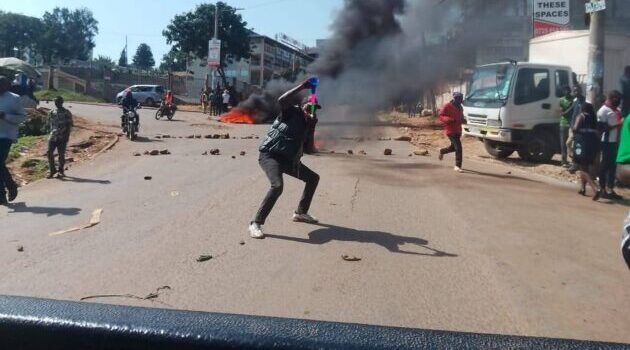
One year later, Kenya’s streets burn with Gen Z rage again » Capital News
NAIROBI, Kenya Jun 25 – Kenyans in cities across the country took to the streets on Wednesday to mark the first anniversary of the historic June 25, 2024 Gen Z-led protests, with renewed calls for justice for the more than 60 people killed during the anti-Finance Bill demonstrations.
While many rallies started peacefully, tension quickly escalated in parts of Nairobi and Kitengela, where police lobbed teargas at protestors.
In Nairobi’s Central Business District, the situation turned chaotic disrupting what began as a peaceful gathering.
Protestors waving Kenyan flags, chanting slogans, and holding placards had earlier congregated at key landmarks including the National Archives and Tom Mboya statue.
However, clashes with police broke out as demonstrators pushed closer to restricted zones.
In Kitengela, police used teargas to disperse crowds, while along the Thika Superhighway, protestors engaged officers in running battles, blocking roads and hurling stones.
In Kisii and Nyeri, demonstrators lit tyres and paralyzed traffic, although police maintained a distance.
Mombasa offered a rare contrast, with peaceful demonstrations conducted under police escort.
In stark contrast to the scenes in Nairobi and Mombasa, Kisumu remained calm with no protestors reported in the city.
Despite its history as a hotspot for political unrest, residents in the lakeside city went about their daily routines, with businesses open and no signs of planned protests.
Security, however, remained tight across the city, with authorities on standby in case of any unrest.
In Nairobi, key roads leading to Parliament and State House were barricaded, while matatus were barred from accessing the CBD.
Commuters were forced to walk into town after police set up roadblocks along Thika Road, Jogoo Road, Kiambu Road, and Waiyaki Way.
Interior Cabinet Secretary Kipchumba Murkomen and Inspector General of Police Douglas Kanja had earlier warned of a firm response to any acts of civil disobedience, even as the National Police Service reaffirmed citizens’ right to peaceful assembly.
Opposition leaders, led by Wiper Party leader Kalonzo Musyoka and former CS Eugene Wamalwa, joined victims’ families in laying wreaths along Parliament Road to honor those killed in last year’s protests.
They were blocked from accessing Parliament due to heavy police deployment.
Kalonzo criticized the government for what he termed “delayed justice” and demanded compensation for the victims’ families. “We will not rest until justice is delivered,” he said.
The protests unfolded amid growing international concern over police brutality.
12 Western envoys on Tuesday including representatives from the US, UK, Germany, and Canada issued a joint statement urging Kenyan authorities to respect the right to protest, avoid the use of excessive force, and cease deploying plain-clothed officers in unmarked vehicles, a practice outlawed by the High Court.
In response, Kenya’s Foreign Ministry warned the diplomats against interfering in internal affairs, calling their statements “overly prescriptive” and urging respect for the Vienna Convention.
As protests continue across Kenya, the anniversary serves as a stark reminder of 2024 unrest and the lives lost. With no convictions yet made over the police killings, frustrations remain high.
Still, many demonstrators say they are hopeful. “We want peace, we want justice, and we want a better Kenya,” said one protestor in Nairobi.